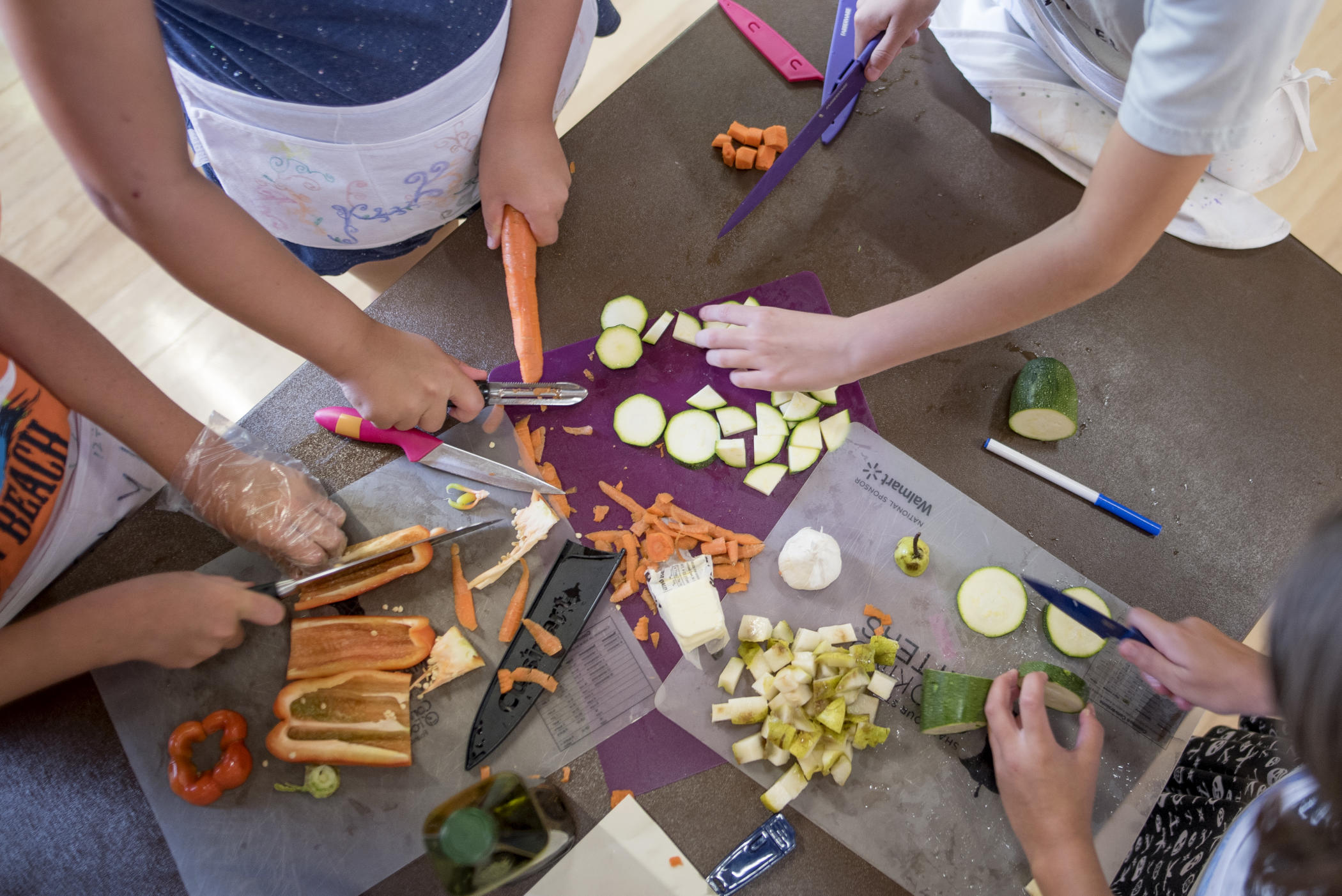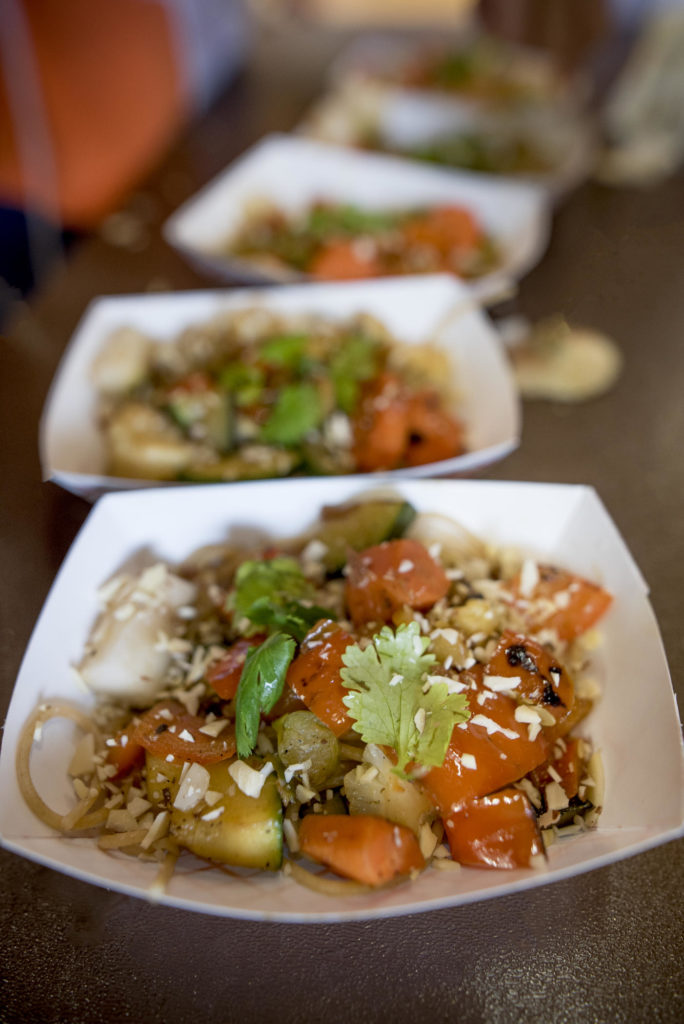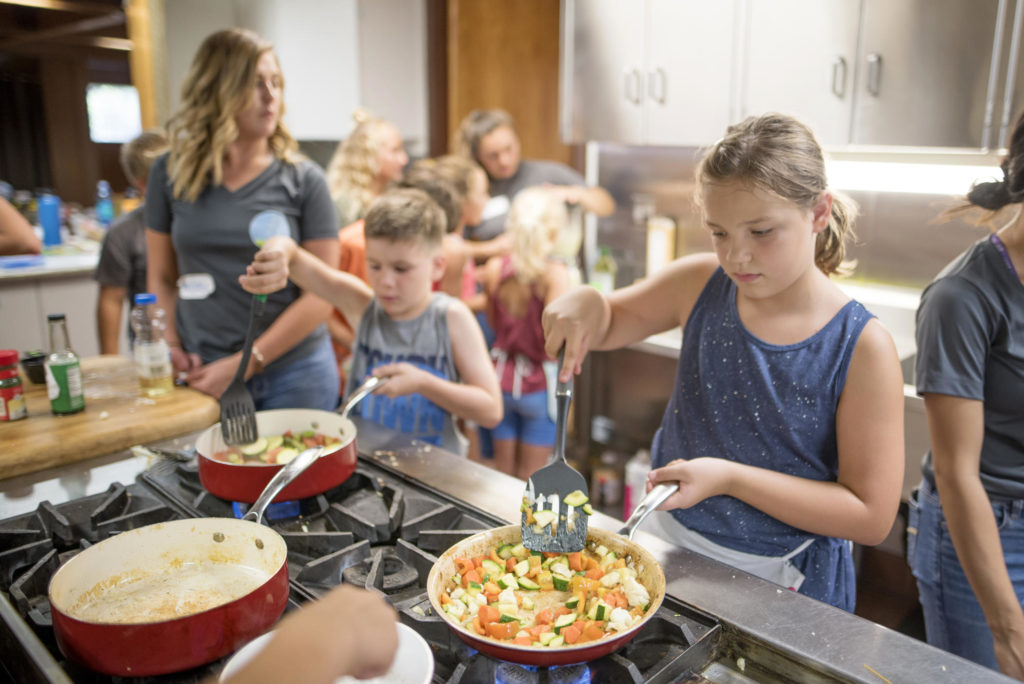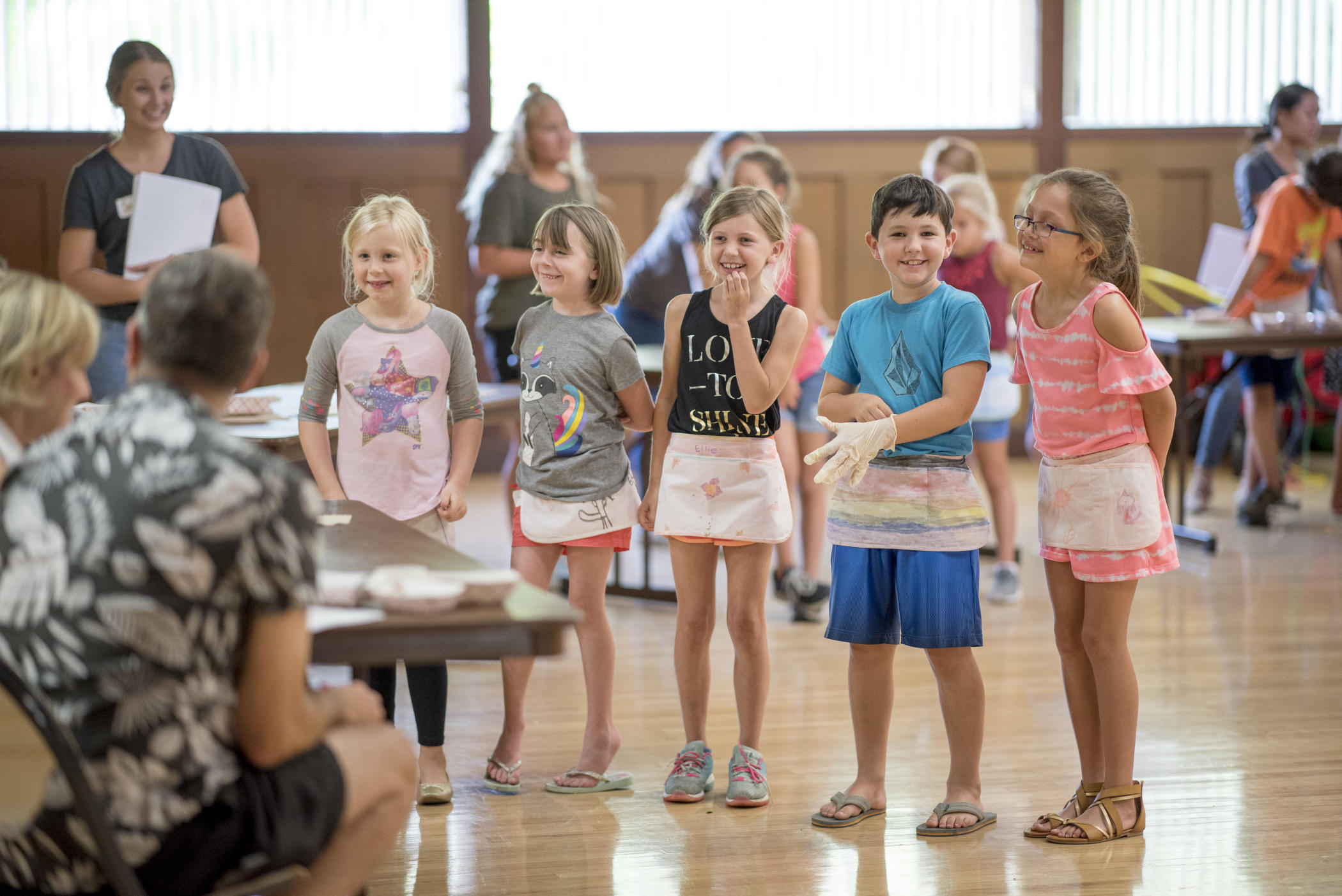Chico State’s Center for Healthy Communities Help Kids Get Cookin’

Children prepare food as they participate in the Get Cookin’ Chopped Challenge. The Chopped Challenge is the culmination of a week-long healthy cooking and lifestyle class for kids ages 7-11 called Get CookinÕ. The Center for Healthy Communities take care of the teaching all week long, and the Chopped Challenge is the culmination of the weekÕs lessons. Teams of kids were given a list of ingredients and they had to prepare a meal using these ingredients on Friday, July 20, 2018 in Chico, Calif. (Jessica Bartlett/University Photographer/CSU Chico)
A dash of laughter, and sprinkle of uncertainty, and a generous helping of teamwork were on the menu this day.
The friendly and frenzied chatter of two dozen children filled the room, mingling with the scent of perfectly seasoned pan-roasted almonds wafting from the kitchen. Chico-area child chefs tested their new skills during the final day of Get Cookin’, a weeklong interactive cooking summer camp developed by Chico State’s Center for Healthy Communities (CHC) and run through the Chico Area Recreation and Park District (CARD).
CHC staff and Chico State students run Get Cookin’ from start to finish, providing the curriculum and counselors. Eager campers ages 7–11 participate in daily lessons on nutrition and cooking basics, as well as outdoor physical activities.
“The kids learn how to chop, how to mince,” said Jen Murphy, a CHC nutrition education specialist and Chico State faculty member. “They learn about food safety, how to read a recipe, how to bake, how to sauté.”

After a week in the kitchen, the camp’s culminating event is the Chopped Challenge, a friendly team competition to create a winning dish with four unrelated ingredients. Students pace their tables waiting for their mystery baskets. With a flourish, the items are revealed: asparagus, almonds, a pear, and cauliflower.
To bolster their gastronomical creations and fuel their creative juices, a table with a few dozen leftover ingredients from the week’s lessons is free to rustle through. The teams pilfer their way through zucchini, almond milk, and an orange, and ransack the pantry for honey, garlic powder, and spaghetti.
The excited campers move quickly, if not chaotically, throughout the multipurpose room and the kitchen. Imaginative ideas float from voices huddled around prep tables as counselors softly guide the recipe and execution.
The teams have just 60 minutes to create a dish to be evaluated by a panel of “celebrity judges”—and one Friday, I was lucky to be among them. I joined CHC health education specialist Melissa Stearns and communications sciences and disorders faculty David McCoy to cast a critical eye on everything from hand-washing and knife safety to teamwork and, of course, the finished product.
At one point I watch as a camper drops a pear, which rolls on the ground a bit before he snatches it up.
“I hope you’re gonna wash that,” I say with a smile.
“I will!” he responds, dutifully beelining his way to a sink as his counselor and I share a laugh.
Now in her third year teaching the camp, senior Julianne Brauer and her fellow counselors take great care showing the kids how to handle themselves while handling food. From demonstrating chopping and hand placement to emphasizing the importance of communication around a hot stove and cooktop flames, safety is the leading emphasis.
“Over the course of the week, the kids become more independent with their knowledge of nutrition and their skills in the kitchen,” Brauer said. “It’s fulfilling and empowering to build their confidence and watch them go.”

Murphy noted the CHC interns also acquire skills they can use through the rest of their lives—both inside and outside the kitchen.
“As a CHC intern, the goal is to learn health promotion skills, acquire the ability to identify needs and strategies to address those needs,” Murphy said. “They’ll also learn to integrate civic engagement experiences with the lifelong practice of giving back, network with area school and community leaders, and ultimately make their career contributions here in the North State where they are critically needed.”
Time quickly becomes of the essence as dishes come together. Teamwork begets a certain kind of efficiency: Some team members chop and mince, others sauté or bake, while still others begin cleaning up. And that’s the point: No matter a child’s age, ability, or experience, there’s a place for everyone.
“Some of them have never used a knife before they come here,” said Brauer, “and by the end of the week they’re cutting up their veggies and they’re putting meals together.”
Fifth-grader Adam Daniels loved Get Cookin’ so much, he attended camp twice. Cooking is his hobby and his favorite part of camp is the Chopped Challenge.
“If I have a recipe, I know everything I have to do,” he said. “But it’s also fun not knowing. You just use really random things.”
Every camper reacts differently to the healthy pressure.
“They get so excited and nervous, they think it’s a big deal when the judges are here,” said camp counselor Sam Donskey (Health Education, ’18).

When it came time to taste the dishes, the range of ideas was truly impressive. Team Awesome served up salad and smoothies. The Fab 4 concocted cauliflower rice with roasted almonds and grilled asparagus with salt, pepper, and lemon. The Little Chefs’ special was a sweet and savory crisp. The Eliminators arranged a salad with kale, cauliflower, pears, almonds, apple, and asparagus. And the Master Chefs made stir fry using spaghetti, pears, peppers, and crushed almonds.
As judges, we doled out reactions like compliment sandwiches, buffering constructive criticism between doses of high praise. Taste, creativity, and presentation were all on the table. Ultimately, the Master Chefs walked away the winners, thanks to their imaginative and effective use of spaghetti in the stir fry extravaganza.
As the camp continues to grow in popularity, Murphy said she is already planning Get Cookin’s ninth summer camp season in 2019, and looking for ways to hone her own recipe for success.
“If there was one thing I’d change about the Chopped Challenge,” said the ever-competitive fifth-grader Adam, “is knowing what the other team is doing, so we could top that.”


